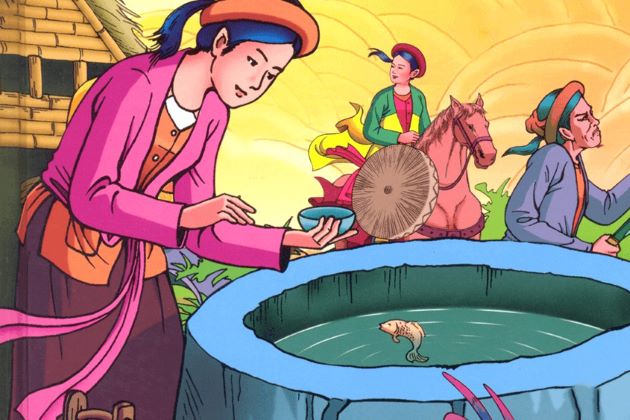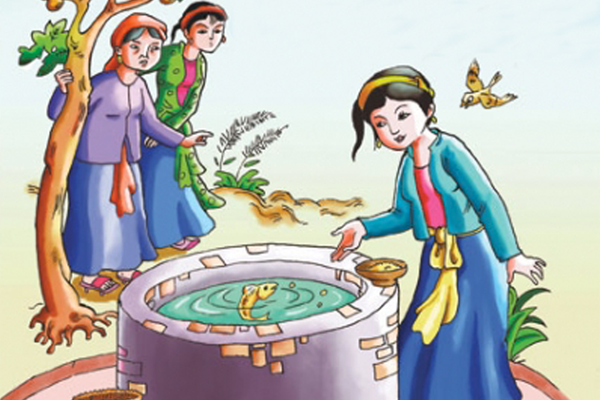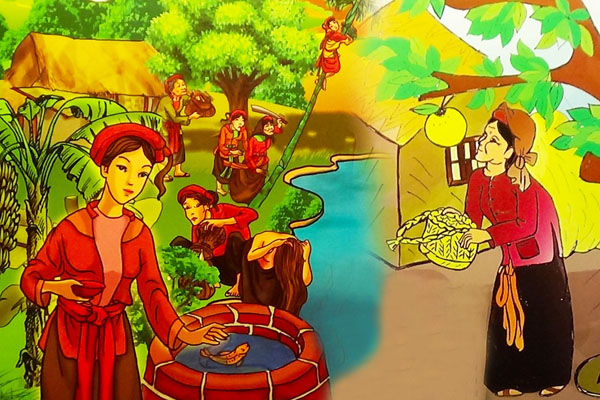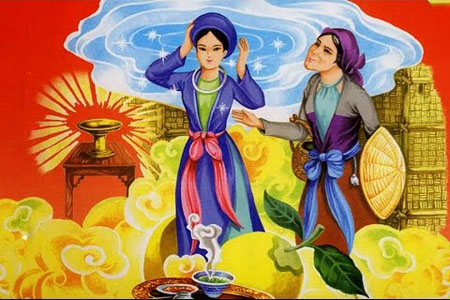Tam Cam is one of the most Vietnamese Fairy Tales which have been told to children for generations

On the outskirts of the capital, Thang Long there was once a family of middle peasants who had a comfortable income and lived in perfect harmony. The bird of a little daughter came, bringing brighter color into the fabric of this peaceful and laborious life. The baby was called Tam.
Alas! This happiness was short-lived. The mother died when Tam was only three years old. The father, overwhelmed with sorrow, was all the more afflicted because this marriage had given him no son who would continue the cult of ancestors.
So, three years after, he married a second wife, who proved to be kind to Tam. The father was very happy with his good choice, but soon after, he was greatly disappointed by the birth of a second daughter. This little one was named Cam. Sometime after, the father fell ill and died.
From that time onwards, Tam suffered cruelty from loneliness, because, after the birth of Cam, her stepmother began completely to change her attitude towards her. The step-mother devoted herself entirely to her daughter, and gradually, in the very house of her father, Tam became a sort of unpaid, ill-fed, and tattered servant: in a word, the family drudge. Her half-sister, on the other hand, was exceedingly pampered.
Years passed. The two children grew up and Tam blossomed into a young girl whose beauty could not be lessened by her hard conditions of life. She was kind and hardworking, respectful to her step-mother who treated her so badly and showed no ill-feeling towards Cam.
The great care that was taken of Cam could not mitigate her ugliness; on the contrary, her education, her habitual laziness, and the fact that she was accustomed to having all her whims satisfied, only served to further accentuate her violent, cantankerous, and jealous character.
When the head of the family died, want to replace the comfort of the previous years.
Early one morning, the mother ordered the two sisters to go fishing in the rice fields where seasonal floods bring many small aquatic creatures which the peasants add to their daily diet. The two little girls, each with a fishing basket in her hand, went to explore the soft mud of the rice fields. The step-mother had promised to give a beautiful red silk camisole to the one who did the best fishing. Tam, courageous as usual, set to work immediately. So when noon came and it was time to go back home, her basket was full of crabs and shrimps. Cam, on the contrary, had made no effort and a few shrimps constituted her catch.
However, she did not want to lose the scarlet camisole, so when they passed by a pond, Cam said to her elder sister: "Sister Tam, you got mud in your hair while you were fishing; if our mother sees you dirty like that, she will certainly be displeased and will punish you. So plunge yourself in this pond."
Tam, very credulous, followed her younger sister's advice and leaving her basket on the bank, plunged into the water. Then the perfidious Cam seized her sister's basket, emptied its contents into her own, and hurried home, where she was loudly praised by her mother and presented with the famous camisole.
Tam did not even try to clear herself. She knew that Cam would get the best of it without fail. However, she was greatly upset by this misadventure. Left to herself, she was weeping bitterly, when Buddha appeared to her." Tam, my child, why are you weeping?’, he asked. The young girl, much distressed described her misfortunes. "Stop weeping," Buddha replied, "Look in your basket, perhaps, there are some fish or shrimps still left in it."
Tam scrutinized the bottom of her basket and indeed, she found a white fish no longer than her own finger, which was still wriggling with what remained of its life. Following Buddha's advice, the young girl put the little fish into the crescent-shaped pond covered with pink lotus flowers, near the village pagoda. The revived ca bong disappeared under the wide round lotus leaves.
"Every day", Buddha continued, 'you will keep back some grains from your rice and feed this fish with them. To call it to the surface you will say: Ca bong! Ca bong! Where are you? Come on if you want to share your sister's rice! The meager rice which belongs to you is worthier than the gold or silver soup of others’. After uttering these mysterious words Buddha disappeared.

From that time, Tam did not feel lonely any more. She had a confidant, a being to tend and love, and she never missed going to the pagoda pond and dropping into the water, grain by grain, the half bowl of rice she deducted from her poor pittance. She came furtively, taking great care that nobody would learn her secret. As soon as the spell was uttered, the little wriggling fish came up to the surface close to Tam.
Cam soon noticed these comings and goings of her elder sister. She informed her mother and both decided to capture the little fish,
The next day at dawn, the step-mother sent Tam to the fields to pasture the family buffalo, purposely pointing her to a faraway grass field.
As soon as Tam was out of sight, Cam and her mother went to the crescent-shaped, lotus-covered pond and, by means of the spell had Cam overheard, they called up the fish, caught it, and took it home. Cam had it grilled and ate it.
When Tam returned from the pasture land, she seized the first moment of respite to run to the pond and see her fish. She called it as usual, but the pond remained silent and the confidant of her sorrows did not appear. Leaning down to the water, Tam perceived a tiny clot of blood floating near the block of stone from which she used to utter her call...
The thing which she had vaguely feared during her absence had happened: the little ca bong was dead. Sitting on the brink of the pond, she wept for a long time.
Buddha reappeared and, like the first time, inquired the reason for her sorrow, "Stop crying,’ he said at last, ’Go back home, little girl. Go to the bamboo-fence, look carefully and you will find the remains of your friend. You will pick them up and put them in an earthenware vase,
that you will close carefully and bury at the foot of your bed. Later, you will be in need of this pot." Then once again Buddha disappeared as he had come.
Tam returned home and searched in vain in the soil along the fence referred to. A cock that was scratching for food near her, said: "Give me a handful of rice and I shall help you.’ Thanks to this unexpected assistant, the bones were soon discovered and Tam enclosed them in a pot, which she buried according to Buddha's instructions.
A year passed during which Tam forlornly pursued a life of labor and privations.
That year, in the peace that then reigned, the crops were splendid. To celebrate this happy event, a big festival was to take place in the capital. Everybody was making ready for the rejoicings.
Cam took out her most beautiful clothes, and spent long hours washing and perfuming her hair; for poor Tam who had never worn anything but old rags, these preparations had no significance. And besides, her step-mother did not want a tattered daughter to appear at the festival. She mixed up twenty bushels of paddy and rice and ordered Tam to sort them carefully before going to the fete. Having inflicted this piece of drudgery, mother and daughter set out.
Left at home on her own and busy with her impossible task, Tam burst into a torrent of tears and again Buddha appeared saying: "I shall send all the sparrows roundabout to help you..." — "But If they eat most of the grain, I shall be punished," complained Tam. "No fear of that; no grain will be missing," he replied and went away. And the work was done as Buddha had predicted.
So, Tam was able to go to the festival. But, once again, she was deeply troubled. To go there, certainly, was most attractive but, in such miserable rags? The good genie appeared again and said: 'Don't be so wretched. Dig up the pot in which you enclosed the bones of the ca bong. You will find all you need.’
Tam dug up the little vase and drew from it a pair of beautiful silk trousers, a blue brocade dress, and a magnificent pair of sandals embroidered with phoenix wings and decorated with jewels. The whole suit fitted her ravishingly. The young girl's beauty, enhanced by this brilliant attire, was scintillating.
She immediately hurried off to the festival place drawing forth constant cries of admiration on her way.
As she came to a bridge, she heard the boom of tom-toms and the powerful voices of heralds announcing the arrival of the King. Everyone immediately cleared a passage and Tam hurried so much that she stumbled on the edge of the bridge, almost falling, and losing one of her slippers.
The royal suite reached the bridge. Suddenly the leading elephant stopped short refusing to advance in spite of its driver's efforts. The King's whole suite was puzzled; surely there must be something unusual under the bridge! The King ordered the river bed to be searched.
The famous slipper was found and the sovereign, deeply moved by the sight of this tiny and wonderful thing, was determined to meet its owner, who must be extremely pretty to have such little feet. So the royal heralds proclaimed the prince's will: the lucky person whom the slipper fitted would be the queen. Young girls came flocking from the four corners of the country. Cam was among the numerous candidates who failed at the trial. Tam came in her turn and the trial was ended; the precious shoe fitted her little foot perfectly; moreover, the young girl owned another slipper just like it.
This success, immediately proclaimed by the royal heralds, plunged Cam and her mother into a jealous fury. First of all, they had not recognized Tam in her splendid clothes. They did not expect to see her at the festival and even less did they expect to see her win such a trial. The sovereign, completely conquered by Tam's beauty, made her his wife, as he had promised. This was an unexpected joy for the poor girl, and the beginning of a flight of happy days, during which her sweetness and her kind heart more and more strengthened the love that her royal husband felt for her.
But as the anniversary of the death of her father approached, Tam asked the King's permission to go back to her native village to attend to the traditional ceremonies.
The honeyed words that welcomed her were in strange contrast with the cruelty of the past days, but Tam did not evoke this painful past. If she, however, was without rancor, her step-mother and sister had not yet forgotten their spite, and while Tam attended to her domestic affairs, they made up their mind to get rid of her.
One morning, the step-mother said to her: "You have prepared sumptuous offerings for the paternal altar. But piety is not measured by the value of the gifts, it is the sincerity of the heart that is important. You must carry out some personal act: if you climb up this areca-tree and with your own hands pick a bunch of nuts and take them to the altar, it will be a much worthier offering.'
Suspecting nothing, Tam went to the tall, straight areca-tree and began climbing it. The step-mother and her daughter waited until she reached the top and then they attacked the trunk with hatchets. Hearing the chopping, Tam asked what was happening. “Nothing", answered the wicked woman, "red ants are creeping up the tree, and fearing that they might sting you, we are hitting the trunk to make them go away."
Cam and her mother continued to hack the areca- tree until it fell with an ear-splitting crash into the deep, muddy water of a nearby pond.
Poor Tam was drowned in it.
The step-mother had Cam dressed in the beautiful garments of her sister, guided her to the King's palace, and spread the rumor that the queen had fallen ill in her village and that she would be forced by this illness to live in a dark room. The King believed the story.
Ready about the tour in Vietnam for Adventure travel Vietnam, family tour package Vietnam, or Tour to Hanoi Vietnam here
But the soul of gentle Tam became reincarnated in a beautiful yellow oriole who came and sang in the royal garden. The bird, fluttering here and there of its own accord, followed the servants as they went about their various occupations in the palace gardens.
One day, when one of them put the King's coat out to dry on a fence made from bamboo stakes, the bird said to him: “Don't put my husband's coat out to dry like that, it will be torn by the points of the fence. Put it on a horizontal bamboo pole."
The words uttered by the bird were immediately reported to the sovereign who went to the garden. Perched on an apricot-tree, the oriole was singing at the top of its voice. "Yellow oriole, yellow oriole, yellow oriole," said the King, "If you are really my wife, slip into the sleeve of my tunic" The bird did so at once. Overjoyed, the King caressed it, gave it a beautiful gold and scarlet lacquered cage, and from the very first moment devoted tender care to it. Ripe seeds and freshwater were never missing from the cage and the King spent all his leisure hours beside it, resting from the cares and troubles of power listening to the trills of his favorite oriole.
News of this attachment reached Cam's ears and she informed her mother about it. The mother advised her to avail herself of an absence of the King to kill the oriole. Cam followed her mother's advice and had the oriole roasted, and ate it, after hiding its feathers in a remote and solitary corner of the royal garden.
From these feathers was born a peach-tree which soon became covered with fairy-like adornment. It was not long before the King began to take pleasure in coming to rest in this flowery corner where he had his hammock hung. The stubborn and vindictive Cam was as jealous of the peach-tree as she had been of the bird and the fish. She complained to her mother about the King's new predilection.
"Have the tree cut down," suggested the mother "and have a weaving-loom made from its wood." And so the peach-tree was felled and sold, and from its wood, the handicraftsmen of the capital made a very beautiful loom that Cam wanted to try out as soon as it came into her possession. But the implement creaked and an almost human voice cried into the weaver's ears: "You stole your sister's husband. Your sister will tear you apart!". Cam, in terror, once again reported these facts to her mother who advised her to break up the disquieting loom and to burn it piece by piece.
But, far from the palace, on the very spot where the ashes of the loom were thrown, there was born again a beautiful tree, a cay thi which rapidly reached a great height and cast a wide shadow. Passers-by willingly lingered under it to take some rest. An old woman conceived the idea of setting up a modest table there under a light plaited bamboo shelter to sell tea, tobacco, and cakes. The good merchant woman was well-known for her honesty and kindness. It was rare that anyone passed by without lingering a while to have a chat with her or to have a puff of the water pipe...
One evening, as the old woman folded up her little stall and was getting ready to return to her humble cabin. In the warmth of the evening, she smelt, more strongly than ever before, the penetrating odor of the cay thi fruit. Gazing at the well-laden top of the tree, she saw there one piece of fruit of uncommon size and beauty. As she could not reach it, in her heart she expressed a wish: "Oh, thi! Will you fall into my bag, so that I can smell to my heart's content?" And there, into the open bag fell the single piece of fruit; the good old woman astonished and happy, quickly took the fruit home and placed it on a little round table near her bed.
With the wonderful fruit, something even more astonishing came into the kind old woman's hut. Every evening, when she returned home, she found the house perfectly arranged, and on the heavy wooden bed, a tray, laden with delectable and newly prepared dishes were waiting for her, even though she used to lock up the doors when she went out. Here was a mystery that she wanted to solve. One morning, at the same hour, as usual, she pretended to leave home but immediately retraced her steps. Nearing the bamboo partition, she looked through a chink and saw a young girl of rare beauty doing the house-work. The widow came in, took the strange girl in her arms, and asked her who she was and why she was taking so much care of this poor cabin.

Tam for it was she, then told her whole story with its misfortunes and her successive reincarnations. Heaven, she said, had transformed her into a fairy: she lived in the wonderful fruit of cay thi and had been sent to earth to help the kind old solitary woman whose virtues were well-known to the heavenly powers. The old merchant woman begged the young woman not to change herself again, and with the girl's consent, she tore to pieces the downy yellow rind of the empty fruit. Henceforth, she had an adopted daughter.
The young woman proposed that they open a little inn, close to the village gate, too, spare the old woman the long walk to the former place. The newly adopted daughter was so pleasant to look upon, so diligent and kind that the place quickly became famous. One day, the King, traveling incognito and accompanied by one attendant, stopped there for a short rest. The old innkeeper brought him some fragrantly perfumed tea and, on a little shining tray, some areca nuts and betel leaves artistically rolled by Tam into the shape of phoenix wings. The elegant way in which the leaves were prepared attracted the King's attention. "How is it that these betel leaves seem strangely like those that my wife used to prepare?’, he said to himself, and he asked to meet the person who had prepared these leaves. The old woman called her adopted girl, and immediately, the King recognized Tam whom he had never been able to forget. The young woman told him all her adventures. The King's joy was immense, and the very next day, a cortege arrived at the humble peasant cabin to conduct the queen to the palace with all the ceremony due to her rank.
Cam afterward met with a terrible death and her mother died after being smitten with great remorse.
As for beautiful Tam, she was a queen whose wisdom and virtue were always equal to her grace and beauty. She lived for a long time making her husband the King happy and helping him with her clear-sighted advice to worthily fulfill his lofty mission. This is the end of Vietnamese fairy tale: Tam Cam



